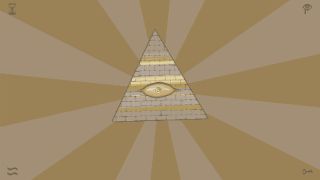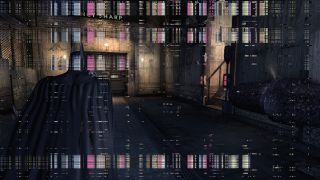Stellar horror games on current-gen consoles are slim pickin's right now. Alien: Isolation and P.T. are at the top of the heap, instilling a persistent sense of encroaching dread as you tiptoe through quiet spaces, praying that you don't encounter your supernatural stalker. Outlast will do in a pinch even if its scares stumble during the late game, and Resident Evil: Revelations 2 or The Evil Within will suffice if you can stomach their more frustrating gunfights. But so far, nothing on Xbox One or PS4 has tapped into one of the most effective, insidious types of virtual terror: when games force their way through the fourth wall to scare the bejesus out of you.
Any time this kind of horror has been done right on consoles, the resulting scares are unforgettable. One of the most beloved moments from Batman: Arkham Asylum is when Scarecrow's fear toxin seems to corrupt and crash your game, restarting with a twisted version of the opening cutscene. Eternal Darkness is packed with sanity effects that play tricks on your mind, from mild misdirections like your TV's volume suddenly being muted, to more extreme hallucinations like empty inventories, save files that delete themselves, or bugs crawling all over your screen. Psycho Mantis and his telekinetic powers are legitimately unsettling when you're playing through Metal Gear Solid for the first time. Silent Hill: Shattered Memories and Cursed Mountain, both for the Wii, use the Wiimote's embedded speaker to create some seriously creepy ambience that leaks out of the game world and into your personal space.

But those standout console examples are tame compared to the paranoia-inducing trickery that's possible on the PC. Plenty of PC games use ingenious programming wizardry to create unexpected, almost invasive scares that break through the boundaries of the game itself. Please, Don't Touch Anything can abruptly shut itself off after filling your screen with the profoundly freaky eyeballed-pyramid you see above. Imscared terrifies you by making images of its ghostly antagonist pop up in your browser after you think you've quit the game, and taunts you by creating threatening messages in the game files the further you progress. Oneshot is an innovative RPG that plays off the main character addressing you directly, with the villain also able to chime in via error messages that tell you to just give up (the game even re-codes itself upon completion to ensure that you can't replay it). My personal favorite fake-out comes from a horror game aptly named The 4th Wall, where exiting the game after it’s apparently frozen up leads to... this.
There's no warning that these games are going to breach the seemingly safe, 'I'm definitely not playing right now' space of your computer desktop. Augmented reality games like Evidence cleverly used email and text messages to push the scares beyond the confines of a program file, but you have to provide an opening in the fourth wall via a valid email address or phone number. Please, Don't Touch Anything, Imscared, Oneshot, and The 4th Wall don't ask for your permission before they freak you out - they just do it. They're like viruses that only use their unsolicited file-rewriting, program-terminating facilities for good ('good' meaning completely unnerving scares that make you want to unplug your computer).

Then again, it's easier to pull one over on the player when the system they're using isn't primarily used for gaming. The fourth wall that is our computer screen feels so solid because so few programs ever mess with it. All those hours spent checking emails, browsing YouTube, and or IMing friends lull you into a sense of security when you're sitting at your computer. But all it takes to undermine that protected feeling is a program popping up - when you thought it was closed for good.
By comparison, the Xbox One dashboard and PS4 home screen are much more sterile, unable to compete with PCs for our idle attention. For all their cable TV functionality, Netflix and Skype apps, we simply don't view consoles as all-in-one work and entertainment stations like we do our computers. Console games don't get the chance to disrupt your routines with a chilling scare, because you typically use your console for an express purpose without much downtime where you could be caught off guard. We're never exposed to all the folders and files that constitute our games, so there's no opportunity to mess with our expectations there. And even the greatest spooky shenanigans on consoles are liable to backfire. I remember immediately popping out the Arkham Asylum disc to check for scratches before the 'Gotcha!' moment could play out.

But there's still so much potential for fourth-wall-breaking frights in your living room. Rather than the unconvincing bug swarm of Eternal Darkness, why not render a life-sized spider in 1080p that appears to slowly crawl across your TV screen? That trick worked wonders for a while on YouTube (if you're not sure what I'm talking about, check out this comments section for a quick primer). What if your Xbox One could suddenly open a snap window with some horrifying visual, or your PS4 installed and activated a disturbing theme as you were playing, so even the Home button couldn't offer a reprieve from the terror? The miniature speaker embedded in the DualShock 4 is a well of inventive uses, but it has yet to be utilized for terrifying audio (unless the voice of Talion's wife from Shadow of Mordor sends you into a panic). And while it undoubtedly violates the terms of service, just imagine if your system could temporarily bring itself out of Rest Mode, sound out a horrifying shriek with a disturbing image of some in-game monstrosity to match, then go back to sleep like nothing happened. That's the kind of video game scare you'd remember until the day you died.
P.T. comes the closest to this kind of experimental, rule-breaking creepiness by making you scour the options menu to uncover a piece of a puzzle, but it still kept its scares restricted to the game itself. Being exposed to the same type of terror over and over weakens it, and what was once petrifying can eventually feel pointless. But fourth-wall-fracturing scares are fertile ground in the console space, and whichever game can effectively exploit it first will be talked about for years. The fact that anyone still remembers Eternal Darkness is proof of how powerful it is when a scare makes you want to switch off your console in a panic, then dread the thought of what might await you when you turn it back on. If current-gen consoles upped the ante put forth by inventive PC games, they could make you scared in ways you never thought possible. And for many avid horror fans, that's exactly what they're looking for.

